- Home
- Alex Archer
Forbidden City
Forbidden City Read online
Table of Contents
Prologue
Chapter 1
Chapter 2
Chapter 3
Chapter 4
Chapter 5
Chapter 6
Chapter 7
Chapter 8
Chapter 9
Chapter 10
Chapter 11
Chapter 12
Chapter 13
Chapter 14
Chapter 15
Chapter 16
Chapter 17
Chapter 18
Chapter 19
Chapter 20
Chapter 21
Chapter 22
Chapter 23
Chapter 24
Chapter 25
Chapter 26
Chapter 27
Chapter 28
Chapter 29
Chapter 30
Chapter 31
Chapter 32
Chapter 33
Chapter 34
Chapter 35
Chapter 36
Chapter 37
Chapter 38
Epilogue
FORBIDDEN CITY
Rogue Angel 05
By
Alex Archer
All characters in this book have no existence outside the imagination of the author and have no relation whatsoever to anyone bearing the same name or names. They are not even distantly inspired by any individual known or unknown to the author, and all incidents are pure invention.
ISBN: 978-1-55254-959-9
FORBIDDEN CITY
Copyright © 2007 by Worldwide Library.
Special thanks and acknowledgment to Mel Odom for his contribution to this work.
Prologue
Loulan City, China
184 A.D
Everyone in the city hated Emperor Ling's tax collectors. Times were hard. Spring floods had ruined crops and dwellings. Families struggled to make ends meet while still having enough left over to fill the imperial coffers. The Han Dynasty, though, remained unsympathetic to the needs of its citizens. Rebellions had begun around the kingdom.
Occasionally, when angry men grew tired of the heavy tax burden, they killed the royal collectors and took back their taxes. The emperor then had to employ more warriors to protect the tax collectors, and that raised the taxes again.
Of all the emperor's tax collectors, Tsui Zedong was the most hated.
Fat and arrogant, Zedong enjoyed throwing around the emperor's power. It was said that were he not able to add sums so quickly in his head he would have been executed for being a thief.
Dressed in brocade robes, he traveled the countryside inside an opulent carriage. Six armed warriors on horses escorted him and protected the emperor's gold from bandits. All of the warriors were experienced and scarred from many battles.
When the carriage slowed that late spring morning, Zedong slid the rice paper shade from the carriage window and peered out. Loulan City was small, filled mostly with farmers who barely eked out an existence. But there were a few skilled artisans and craftsmen. Most of them had shops on the street he presently traveled.
The driver pulled the carriage to a stop, then got down and opened the door.
Holding his robes together, Zedong heaved his bulk up from the padded seat and got out to do the emperor's collecting. Zedong smelled food in the air. When he stepped down from the carriage, he saw a tavern three shops down. The carcasses of ducks and geese hung from a rope out front, ready for purchase by those who worked inside the city and didn't raise their own livestock.
All of the shops ran in straight lines on either side of the street. Most of them had existed for years, put together by families and trained carpenters. A well in the center of the square provided water for travelers. Several shopkeepers stopped their work and came out to look at the carriage. Most of them wore looks of dread.
The warriors, bristling with swords and bows, tied their horses to the back of the carriage. They took the chest from inside the carriage. Two of them carried it between them.
Several murmured curses echoed along the street. The shopkeepers knew what was about to occur.
Unrolling the scroll the emperor's tax keepers had prepared listing the shopkeepers and the amounts they were to pay, Zedong reviewed the listing for the jeweler he planned to visit first. Zedong rolled the scroll back and entered the small shop.
The jeweler's establishment was small and tidy. On the surface, he appeared to be a poor man, but Zedong knew from years of collecting that many shopkeepers and tradesmen disguised their wealth.
An old woman sat in a chair holding a fat cat in her lap.
"I have come to collect the taxes for the emperor," Zedong announced.
The old jeweler looked nervous. His back was bent from years of hunching over his tools, creating settings and pulling thin gold wire. With a trembling hand, he handed Zedong a cloth bag that clinked.
Zedong knew from the feel of the bag that it didn't contain enough gold. He could have told the shopkeeper that without opening the bag, but he opened it anyway and spilled the contents across his hand.
"There is not enough," Zedong accused.
"It is all we have," the jeweler whispered.
"Nonsense. You have a fat cat. If you have enough to keep your cat fat, then you have enough to pay the emperor his taxes."
"No, I swear to you," the old man said. "It is all we have."
Zedong dropped the bag into the emperor's chest. Then he looked around the shop. "You have gold ingots and jewels."
"Please," the old man begged. "We do not have many of those. Hardly enough to stay in business. If you take those, we cannot make items to sell. Then the emperor's new taxes won't be met."
"If you don't meet the taxes," Zedong promised, "things will go badly for you." He turned to the warriors. "Seize the gold and gems."
The warriors went about their assignment. Screaming in outrage and pain, the old jeweler grabbed one of the warriors by the arm and yanked. Without hesitating, the warrior shoved the old man away and thrust a dagger through his throat.
The jeweler fell and his blood stained the wooden floor. He clasped his throat and kicked helplessly as his life ebbed.
Wailing, his aged wife abandoned her chair and rushed to her stricken husband. She called on the gods and for help from anyone, but no one came. No one dared.
The old woman's pain didn't touch Zedong. He'd ordered the deaths of many others. This one had been easy because he didn't have to think about it. Furthermore, with one man dead, the other shopkeepers would readily pay.
As her husband died, the old woman turned to Zedong. "May the gods curse you," she moaned. "May your life end soon and in painful agony. May you throw up your own entrails and take days to die."
Zedong knew he couldn't afford to allow such an affront. He was the emperor's tax collector. An insult to him was like an insult to the emperor. If he did not avenge it, the emperor would have him executed.
"Kill her," Zedong ordered.
The nearest warrior drew his sword instantly, then slashed down into the old woman, cleaving her from shoulder to heart. With a last gasp of pain, she fell across her husband.
Zedong looked at her and hated her even in death. He kicked her three times, getting madder each time because she wasn't alive to feel pain.
He wished he'd killed her before she'd cursed him. Curses were powerful things.
At his order, the warriors looted the shop. Zedong stood and watched. The fat cat stared at him with its unblinking green gaze. Zedong walked toward it, slipping a dagger from inside his sleeve. When he was close enough, he struck.
But the feline moved at the last moment, leaping over Zedong's knife, landing on his arm and leaping up again. The cat's claws struck Zedong's face above his
right eye. Blood dripped onto his cheek and fire stung his flesh. He swung the knife again, but the cat vaulted through a window and vanished.
Zedong wiped the blood from his face and kicked the dead woman again. He didn't think she had the power to properly curse him. The cat was merely bad luck.
Still, he wished he knew for sure.
That evening, after full dark had finally draped Loulan City and all the shopkeepers had paid, Zedong left town. With two people dead, Loulan City wasn't safe for him. He wouldn't have admitted that to the emperor, though.
Eating roast duck from the large basket of food he had seized from the vendor, Zedong listened to the emperor's gold clinking in the trunk at the back of the carriage. He relished the spicy meat enough to lick the flavor from his fingers.
The carriage took a sudden hard turn to the right. Zedong cursed the driver as he reached into the basket for one of the pastries he'd claimed.
The carriage dodged again.
Cursing more, Zedong slid the window shade aside and took a deep breath to better yell at the incompetent driver. Likely the man had gone to sleep. He had complained of fatigue for himself and the animals when ordered to leave town.
Before Zedong could remember the man's name, the driver's corpse suddenly sprawled over the side of the carriage. The man's dead face slapped against the window. Only the long arrow through his throat kept his head from entering the carriage. A fearful look was frozen on his face.
In a moment he was gone, dropping to the road beneath the whirring wheels of the carriage. The vehicle rose sharply for an instant as it rolled over the dead driver.
Zedong grew afraid. The horses ran faster, thundering over the road as fear filled them.
"Help!" Zedong called out. "Help me!"
Inside the carriage, he bounced vigorously, slamming against the walls and the cushioned seats. He fumbled the door open and gazed outside, thinking of trying to climb up to the driver's seat.
Twenty feet ahead, one of the warriors toppled from his mount with an arrow deep between his shoulder blades. Only then did Zedong see two other riderless horses running after the carriage.
One of the warriors in front of the carriage wheeled his mount around and spurred the animal to speed. "Get back inside the carriage!" the man yelled.
Zedong wanted to retreat to safety, but he wished to know what was happening. Gazing behind the carriage, he spotted a slim rider dressed in black. The rider drew back an arrow and let fly.
The warrior who'd gone to engage the enemy gazed down at the arrow that suddenly jutted from his chest. While he still seemed lost in his astonishment, he slid from the saddle. His right foot didn't clear the saddle straps and his body was dragged across the broken terrain.
The surviving two warriors approached more carefully, riding low over their horses. They closed on the rider in black.
Ignoring them, the rider urged his mount on. He slid the bow over one shoulder and pushed himself into a crouch on the horse's bare back, balanced one foot in front of the other.
Before Zedong realized what the rider was doing, he'd vaulted from his mount to the top of the carriage. Zedong screamed shrilly and dodged back inside the carriage. Glancing through the back window, he watched helplessly as the final two riders went down to arrows.
Seconds later, while Zedong quivered in fear, the carriage came to a stop.
The rider was at the side of the carriage. He held a sword in his hand as he opened the door.
"Out," the rider demanded.
Certain that he'd been held up by one of the many thieves that made travel so dangerous in the area, Zedong obeyed. He tripped on the step and fell to his hands and knees. Before he could stand, a blade was pressed to his throat.
The clouds cleared the face of the full moon in that moment. Surprise filled Zedong when he realized that the thief was a woman. A fox mask covered her facial features.
"Who are you?" Zedong demanded, using the imperious voice that he employed whenever he was on the emperor's business.
She didn't answer. The sword never moved.
"I represent the emperor," Zedong threatened. "Your life is forfeit for killing the imperial guardsmen."
"One more life," the fox-faced woman said, "won't matter, then, will it?"
Zedong had time to think only briefly of the curse the old woman had called down on him. It took a moment more to realize that the woman before him might not have been wearing a mask at all and might have been one of the legendary fox spirit women who drained men of their lives.
His throat was cut before he knew it. Then blackness filled his vision.
1900 A.D.
Huddled beneath a thick wool blanket that stank of wet donkeys, Dr. Heinrich Lehmann, a university professor at Berlin University, cursed in the four languages he knew.
"Steady on, Lehmann," one of the older men at the dig site advised, shouting to be heard over the roar of the storm. "We'll be out of this shortly."
Lehmann ignored the man. He hadn't cared for any of the men Dr. Hedin had employed for the dig. All of them were coarse and vulgar, nothing like the educated men he'd gone to school with.
The windstorm howled and dirt thudded against his blanket.
"Have you ever seen anything like this before?" Lehmann asked.
"Every now and again," the man yelled. He was American, thick and swarthy from equatorial digs. He spat on the ground at their feet. "It's worse in Egypt."
Long minutes later, the windstorm passed.
Lehmann threw the heavy weight of the blanket off. Dust obscured his spectacles. He removed them and cleaned them with his handkerchief. Tall and lean, he was in his twenties, his body stripped of any spare flesh by hard work. He wore jodhpurs, boots and a khaki shirt that was wet with sweat.
Only a few feet away, Hedin doffed his own blanket and looked around. With his glasses and hair in disarray, coated in dust, the Stockholm professor looked like some kind of rodent burrowing out of the dry lands.
"Look!" Hedin pointed.
Staring off to the left where the professor was pointing, Lehmann was amazed. Where piles of loose earth had been, the broken remnants of a city stabbed up at the dusty sky.
"I knew it was here." Hedin's voice barely contained the excitement that filled him.
Lehmann couldn't believe it. Even though Hedin had already achieved several finds in China, in fact had been one of the few Western archaeologists to be allowed into the area, Lehmann had begun to think that Loulan City was nothing more than a fictional reference.
But that would have meant the gold was fictional as well. Lehmann couldn't accept that. He knew about the City of Thieves. Hedin didn't. The Swedish professor had been assigned to map out Asia and to trace the history of the Silk Road, the trade route used for centuries to ferry silk out of China and import Western goods.
"I see it, Dr. Hedin." Lehmann smiled in acknowledgement. The Stockholm professor was only in his midthirties, not much older than Lehmann.
Gazing into the sky, Hedin shook his head. "We need to move quickly. In case Mother Nature decides to take back what she's so freely given."
Lehmann reached for his pack and shovel. Dust and grit rubbed his skin under his clothes, promising yet another uncomfortable day. He pushed the discomfort from his mind, remembering only the legend of the gold and the fox spirit that had stolen the emperor's gold nearly two thousand years before.
Chapter 1
"Do you do this often, Miss Creed?"
Taking her eyes from the thick expanse of the Eldorado National Forest ahead of her, Annja Creed glanced at her hiking companion. "Not often," she admitted. "Generally only when someone has piqued my curiosity."
"And I have done that?"
Annja Creed smiled. "You have." She'd only known the man for a handful of hours. They'd met briefly in nearby Georgetown, California, to arrange for the hiking trip. Before that they'd had conversations online for almost three weeks.
Genealogy wasn't Annja's field of study
. When Huangfu Cao had first approached her about trying to find the final resting place of his ancestor, Annja had decided to turn the man down. As a result of the cable network show she co-hosted, she often received cards, letters, and e-mail requests to help strangers track down family legends. The death of Huangfu's ancestor – though a brutal and interesting story – was too recent to warrant her attention or expertise.
At least, that was what she'd thought until Huangfu had sent descriptions of that ancestor's prized possessions. One of them had caught her eye enough to draw her to California on a cold day in March to go traipsing down old roads that had once led to gold mining towns long gone bust.
Huangfu Cao looked like he was in his early thirties, but Annja didn't bother to guess. She was wrong more often than not. He was five feet ten inches tall, matching Annja in height. But he was thin and angular, contrasting with her full-figured curves. His khaki pants held crisp creases. He wore a dark blue poly-fill jacket against the wind and dark sunglasses to offset the bright afternoon sunlight.
Dressed in a favorite pair of faded Levis tucked into calf-high hiking boots and a black long-sleeved knit shirt under a fleece-lined corduroy jacket, Annja was comfortable in spite of the March chill that hung in the afternoon air. She wore her chestnut-colored hair under a baby blue North Carolina Tar Heels cap she'd fallen in love with at one of the airports she'd passed through in her recent travels. Blue-tinted aviator sunglasses took the glare out of the day. Her aluminum frame backpack carried numerous supplies, as well as her notebook computer, but it was well-balanced and she hardly noticed the weight.
"I'm glad you were interested," Huangfu said.
"Let's just hope we get lucky," Annja said as she scanned the forest before her, barely able to make out the old mining trail they followed.
A century and a half earlier, wagons had carved deep ruts in the land and left scars that would last generations.
"You're in very good shape." Huangfu adjusted his backpack. When he spoke, his breath was gray in the cool air for just a moment until the breeze tore it away.

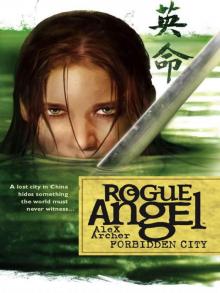 Rogue Angel: Forbidden City
Rogue Angel: Forbidden City The Spider Stone
The Spider Stone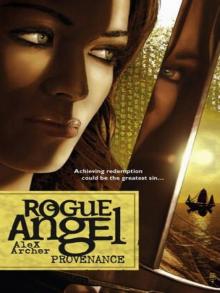 Provenance
Provenance Blood Cursed
Blood Cursed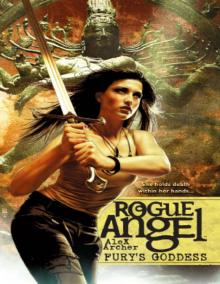 Fury's Goddess
Fury's Goddess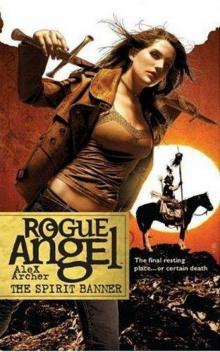 The Spirit Banner
The Spirit Banner Footprints
Footprints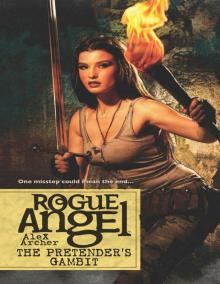 The Pretender's Gambit
The Pretender's Gambit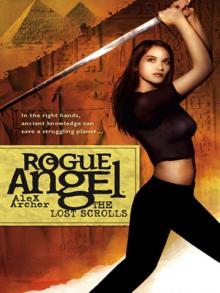 Rogue Angel: The Lost Scrolls
Rogue Angel: The Lost Scrolls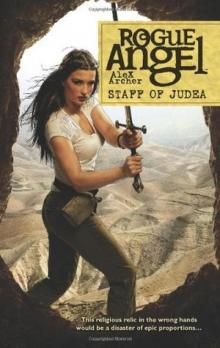 Staff of Judea
Staff of Judea Rogue Angel 55: Beneath Still Waters
Rogue Angel 55: Beneath Still Waters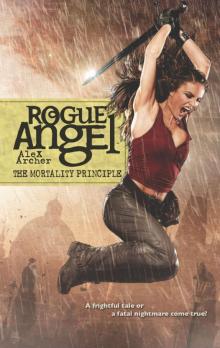 The Mortality Principle
The Mortality Principle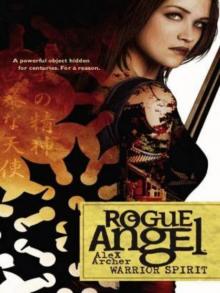 Warrior Spirit
Warrior Spirit Paradox
Paradox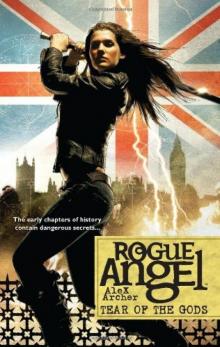 Tear of the Gods
Tear of the Gods Forbidden City
Forbidden City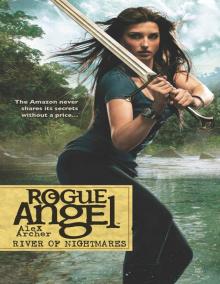 River of Nightmares (Rogue Angel)
River of Nightmares (Rogue Angel)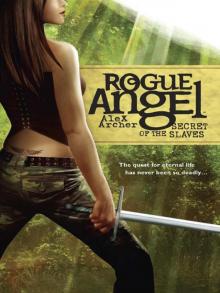 Rogue Angel: The Secret of the Slaves
Rogue Angel: The Secret of the Slaves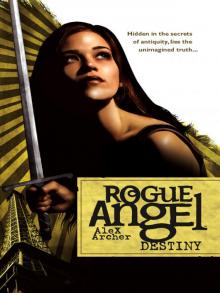 Destiny
Destiny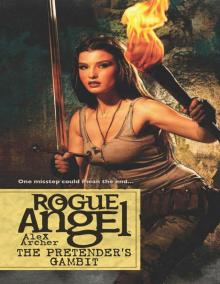 Rogue Angel 51: The Pretender's Gambit
Rogue Angel 51: The Pretender's Gambit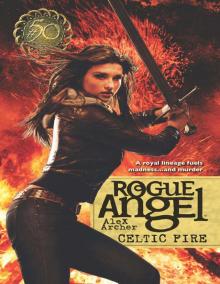 Celtic Fire
Celtic Fire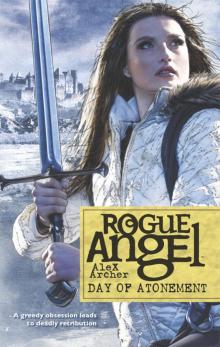 Rogue Angel 54: Day of Atonement
Rogue Angel 54: Day of Atonement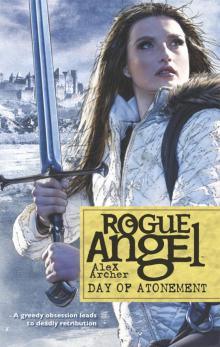 Day of Atonement
Day of Atonement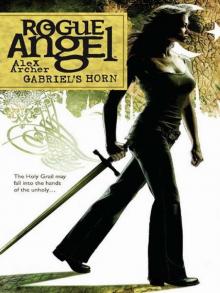 Rogue Angel: Gabriel's Horn
Rogue Angel: Gabriel's Horn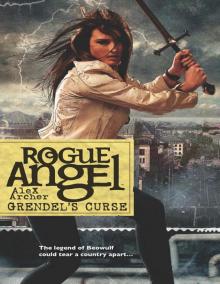 Grendel's Curse
Grendel's Curse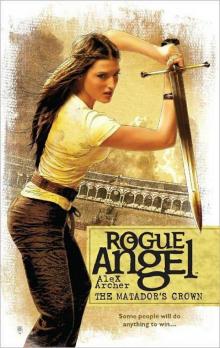 The Matador's Crown
The Matador's Crown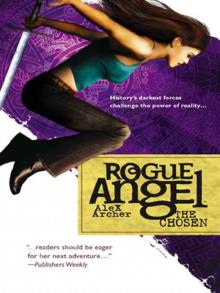 Rogue Angel: The Chosen
Rogue Angel: The Chosen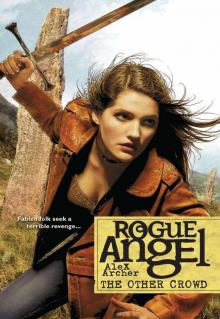 The Other Crowd
The Other Crowd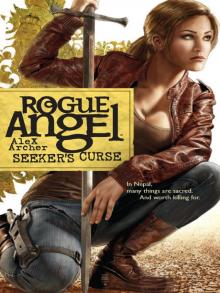 Seeker’s Curse
Seeker’s Curse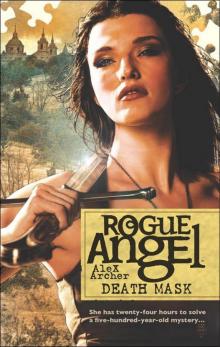 Rogue Angel 52: Death Mask
Rogue Angel 52: Death Mask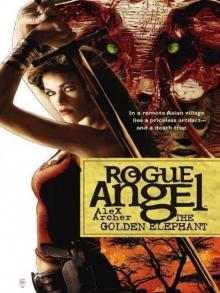 The Golden Elephant
The Golden Elephant Blood Cursed (Rogue Angel)
Blood Cursed (Rogue Angel)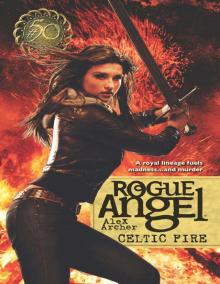 Celtic Fire (Rogue Angel)
Celtic Fire (Rogue Angel)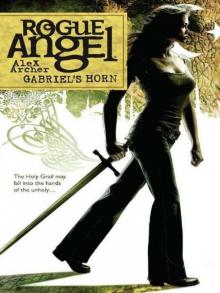 Gabriel's Horn
Gabriel's Horn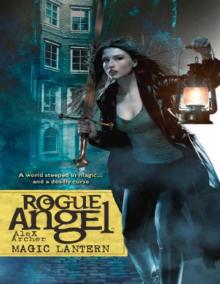 Magic Lantern (Rogue Angel)
Magic Lantern (Rogue Angel)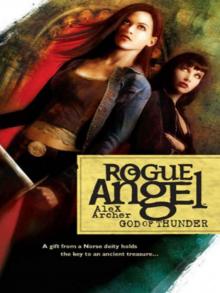 God of Thunder
God of Thunder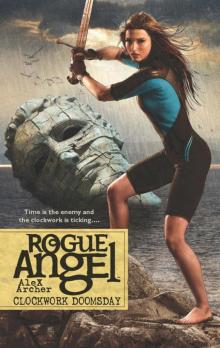 Clockwork Doomsday
Clockwork Doomsday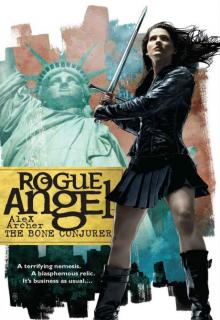 The Bone Conjurer
The Bone Conjurer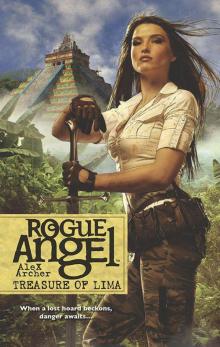 Treasure of Lima
Treasure of Lima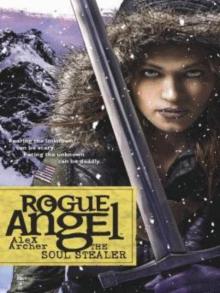 The Soul Stealer
The Soul Stealer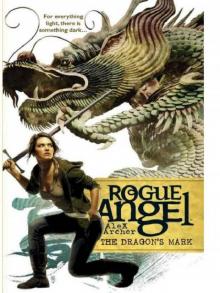 The Dragon’s Mark
The Dragon’s Mark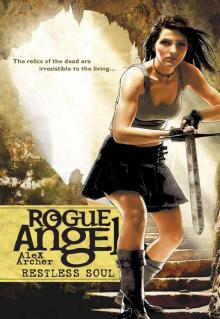 Restless Soul
Restless Soul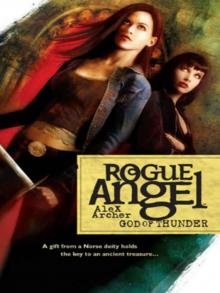 Rogue Angel: God Of Thunder
Rogue Angel: God Of Thunder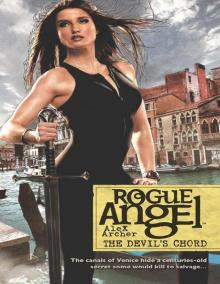 Rogue Angel 49: The Devil's Chord
Rogue Angel 49: The Devil's Chord Death Mask
Death Mask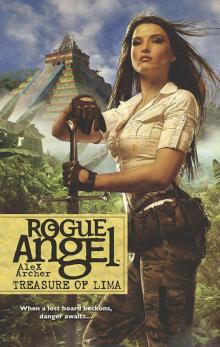 Rogue Angel 46: Treasure of Lima
Rogue Angel 46: Treasure of Lima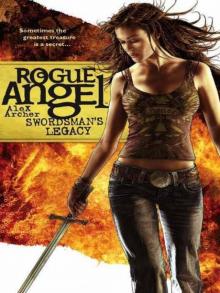 Swordsman's Legacy
Swordsman's Legacy The Oracle's Message
The Oracle's Message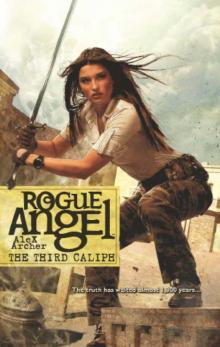 The Third Caliph
The Third Caliph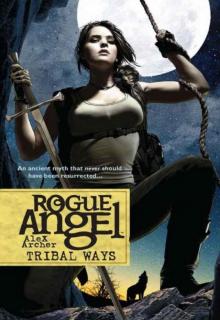 Tribal Ways
Tribal Ways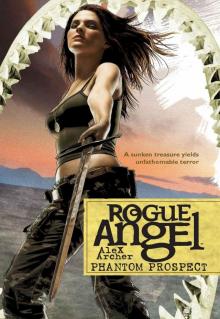 Phantom Prospect
Phantom Prospect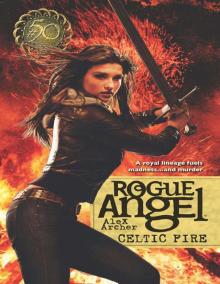 Rogue Angel 50: Celtic Fire
Rogue Angel 50: Celtic Fire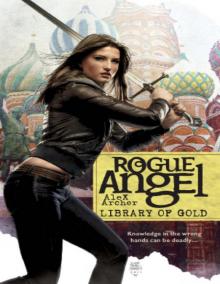 Library of Gold
Library of Gold Rogue Angel 53: Bathed in Blood
Rogue Angel 53: Bathed in Blood Sacred Ground
Sacred Ground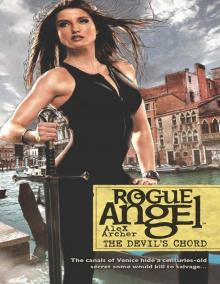 The Devil's Chord
The Devil's Chord Serpent's Kiss
Serpent's Kiss The Vanishing Tribe
The Vanishing Tribe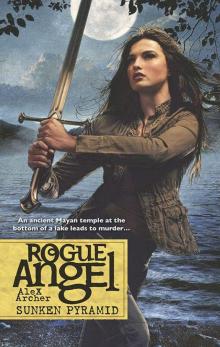 Sunken Pyramid
Sunken Pyramid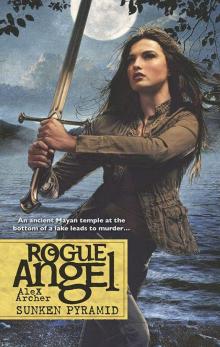 Sunken Pyramid (Rogue Angel)
Sunken Pyramid (Rogue Angel)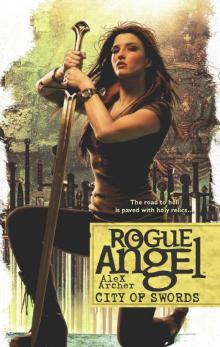 City of Swords
City of Swords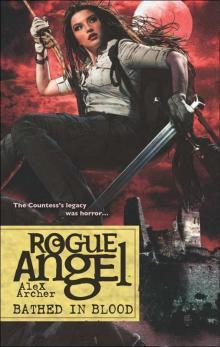 Bathed in Blood
Bathed in Blood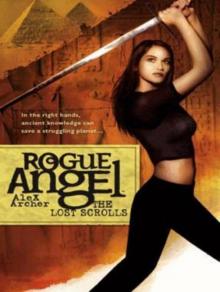 The Lost Scrolls
The Lost Scrolls The Babel Codex
The Babel Codex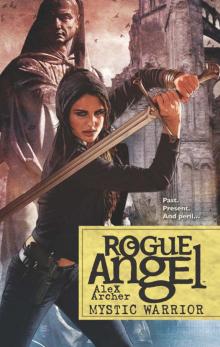 Mystic Warrior
Mystic Warrior Eternal Journey
Eternal Journey Beneath Still Waters
Beneath Still Waters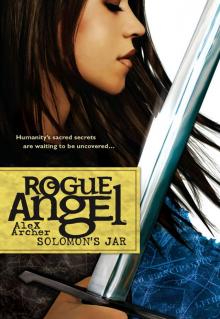 Solomon's Jar
Solomon's Jar Beneath Still Waters (Rogue Angel Book 55)
Beneath Still Waters (Rogue Angel Book 55) Cradle of Solitude
Cradle of Solitude Secret of the Slaves
Secret of the Slaves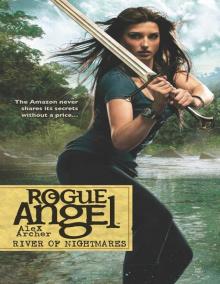 River of Nightmares
River of Nightmares Polar Quest
Polar Quest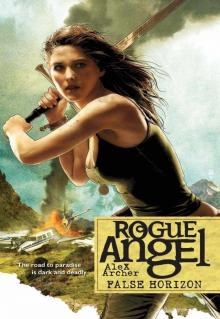 False Horizon
False Horizon